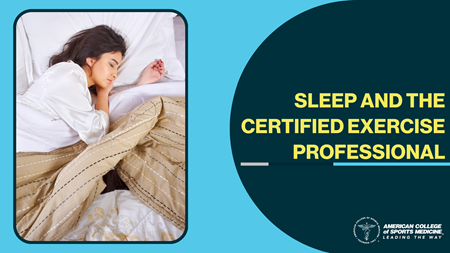Joe Sherlock, ACSM Copywriter |
Oct.
24, 2023

Being an exercise professional, particularly a self-employed one, puts you in an uncomfortable position: You know that sleep is important — critically important, even — for your health, but it also seems to get in the way of all the things you need to do to. The old adage “Sleep, work, social life — you can only pick two” is a little different for the cert pro. Often the situation seems more like “Sleep or work — you can only pick one.” (And notice neither formulation includes “family life” or “self-care,” another pair of variables that, frankly, are probably the most important of all.)
So, how significant is sleep? Is it really something we can sacrifice? What exactly are we sacrificing? And should we give it more pride of place in our lives?
The benefits of a good night’s sleep
First, let’s talk about the light at the end of the tunnel. What will we gain if we put in the effort and manage to consistently get enough shut-eye? According to John D. Chase, M.S., and John R. Sirard, Ph.D., who penned an article on the subject for the ACSM American Fitness Index®, there are a laundry list of benefits. For most adults, seven to nine hours of sleep per night is ideal, and hitting that mark will improve cognition, decrease stress and anxiety, and lower the risk of developing cardiovascular disease and type 2 diabetes. It also seems to have a preventative effect on certain types of cancer.
Meanwhile, Melissa W. Roti, Ph.D., FACSM, director of Westfield State University’s Exercise Science Program, notes anecdotally in another Fitness Index article that as she began to improve her sleep schedule, she also began losing weight. “It wasn’t dramatic,” she writes. “But it was those couple extra pounds I had had a difficult time getting rid of.”
This is all to say that as people focused on improving health, we really can’t overlook sleep.
The downsides of missing sleep
Obviously, if getting enough sleep confers the above benefits, then not getting enough sleep robs you of them. Plus, as Roti later notes, lack of sleep is associated with increased body mass — and, let’s be realistic, not in a “Look at these gains!” sort of way. Beyond that, even sporadic loss of sleep, like getting less than six hours in a single night or multiple nights, can lower your inhibition, impair your memory and increase your reaction time the next day. To be pessimistic: That could make it harder for you to remember your clients’ routines (or worse, names), put you in a position to make risky business decisions, or even make you more likely to injure yourself during your own workouts or when demonstrating movements to your clients.
The impact of sleep loss on physical performance is less clear, but the strongest signal seems to be that losing sleep is most likely to have a detrimental effect on aerobic workouts — more specifically, extended submaximal aerobic work. If you’re an endurance athlete, or you lead aerobically intensive exercise classes, this could be a significant concern. But it also doesn’t seem like to much of a stretch to assume that increased reaction time, stress, and cardiovascular issues are all likely to harm your workouts as well.
Interestingly, you may also experience different outcomes depending on whether you stay up too late or get up too early. Chase and Sirard note that in one comprehensive study, accelerometer data showed that subjects who woke up very early subsequently performed less physical activity than those who stayed up very late. More specifically, those who woke up too early didn’t perform as much vigorous-intensity physical activity as those who’d stayed up. Is this a win for the night owls? It’s far too soon to say.
What to do
According to Roti, consistency is key to improving your sleep: “Between-day variability also plays a role, with increased variability contributing to lower quality sleep.” Meaning, getting to bed and getting up at the same time is also important — if you fall asleep at 10 p.m. on Mondays and wake up at 6 a.m. the following morning but go to sleep at 1 a.m. on Tuesdays and wake up at 10 a.m. the next day, you’re not going to see the same benefits. As with exercise, consistency is key. Anything you can do to try to regularize your calendar is going to help you in this department, maybe doing your best to cluster clients in the morning or in the evening rather than scattered across the day.
Meanwhile, a team of authors from Winthrop University penned a third sleep-related Fitness Index blog covering the role stress plays in one’s quality of sleep. They likewise recommend keeping a regular sleep schedule, but they also suggest creating a consistent bedtime routine that will help prime your mind and body for sleep and avoiding both caffeine and screens for at least 90 minutes before bedtime. The also suggest performing deep breathing exercises to reduce stress, which makes it harder for us to get to sleep — and of course exercising three to five times per week, at least thirty minutes per session. But you knew that part already.
Related CEC Courses:
The 24-Hour Movement Paradigm and Sleep (1 CEC)
Industry Presented Webinar: Sleep Tactics for Better Performance (1 CEC)